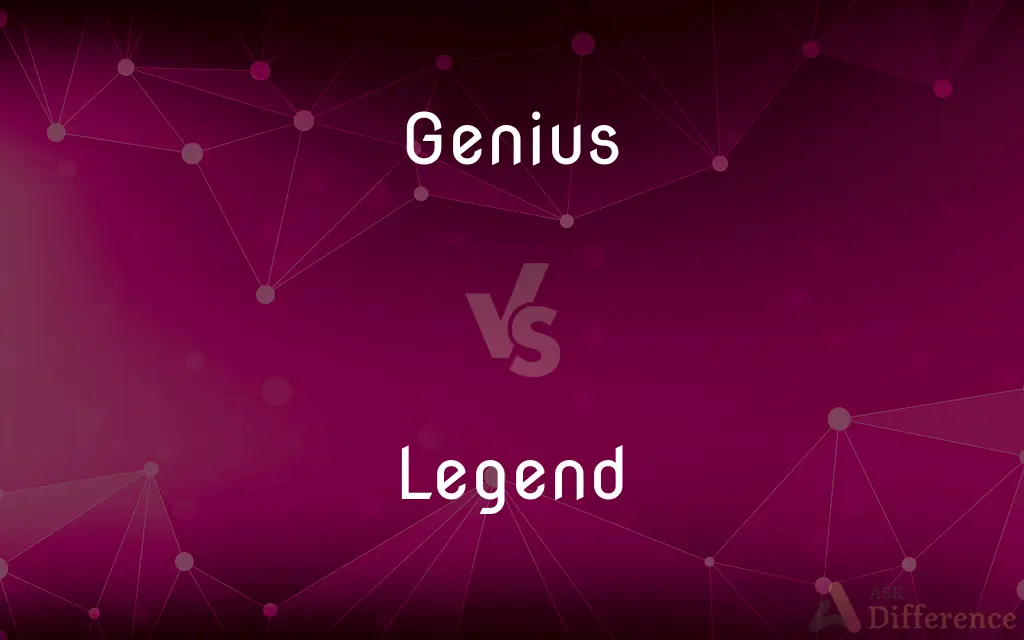Genius vs. Legend — What's the Difference?
By Urooj Arif & Maham Liaqat — Updated on March 19, 2024
Genius primarily refers to exceptional intellectual or creative power, especially as exhibited in creative work. Legend, on the other hand, relates to a famous or notorious person, often with enduring fame or stories that may blend fact and fiction.

Difference Between Genius and Legend
Table of Contents
ADVERTISEMENT
Key Differences
A genius is someone recognized for their extraordinary intellectual capacity and creative prowess, often contributing groundbreaking work in their field. This could include remarkable innovations or theories that significantly impact their domain. Whereas a legend is a person who achieves iconic status in culture, often remembered through stories that may exaggerate their deeds or characteristics, making them a symbolic figure in society.
While genius often implies a natural aptitude or an exceptional skill in a specific domain, such as science, art, or mathematics, it is typically associated with measurable achievements or contributions. On the other hand, being a legend involves a narrative aspect, where the individual's life and achievements are celebrated, sometimes mythologized, in a way that they become part of cultural or historical lore.
Geniuses are frequently alive when their contributions are recognized, and their works or theories can be validated and appreciated in their own time. Legends, however, may gain their status posthumously, with their fame often growing and evolving well beyond their lifetime, as stories about them are told and retold.
The recognition of a genius often comes from academic or professional fields, highlighting a person's intellectual achievements through awards, patents, or publications. In contrast, legends are celebrated in a broader societal context, often remembered through popular media, oral traditions, or commemorative practices.
The concept of a genius is more quantifiable, with IQ tests and professional accolades serving as some metrics for assessment. Legends, however, transcend the tangible, often embodying ideals, moral lessons, or cultural values through the narrative of their lives and actions, which may be embellished over time.
ADVERTISEMENT
Comparison Chart
Definition
Exceptional intellectual or creative power.
Famous person, often with stories blending fact and fiction.
Recognition
Through academic or professional achievements.
Through cultural storytelling and media.
Time of Fame
Often during their lifetime.
Can be posthumous, growing over time.
Basis of Status
Intellectual contributions, innovations.
Iconic status, stories, possibly mythologized.
Measurement
IQ tests, publications, patents.
Cultural impact, stories told and retold.
Compare with Definitions
Genius
Someone who has an exceptionally high IQ.
A genius might be a member of Mensa, the high IQ society.
Legend
A person who is famous for doing something extremely well.
Muhammad Ali is a legend in boxing.
Genius
An individual with a natural aptitude for a particular task.
She was a genius at solving complex mathematical problems.
Legend
Someone whose life and actions are the subject of stories.
Robin Hood became a legend for his deeds.
Genius
A person who introduces new ideas or innovations.
Steve Jobs was considered a genius for revolutionizing technology.
Legend
A figure whose contributions have become a part of popular culture.
Marilyn Monroe remains a legend in film and fashion.
Genius
A person with exceptional intellectual ability.
Einstein is often cited as a genius for his theory of relativity.
Legend
A person whose fame or notoriety makes them a symbol of a certain quality.
Beethoven is a legend in the world of classical music.
Genius
An exceptionally intelligent person or one with great creativity.
Mozart showed his genius through his symphonies from a young age.
Legend
An individual remembered for an iconic act or characteristic.
Neil Armstrong is a legend for being the first person on the moon.
Genius
Extraordinary intellectual and creative power
Artistic works of genius.
Legend
(naval) The design and specification of a vessel.
Genius
A genius is a person who displays exceptional intellectual ability, creative productivity, universality in genres, or originality, typically to a degree that is associated with the achievement of new discoveries or advances in a domain of knowledge. Geniuses may be polymaths who excel across many diverse subjects or may show high achievements in only a single kind of activity.There is no scientifically precise definition of a genius.
Legend
A legend is a genre of folklore that consists of a narrative featuring human actions perceived or believed both by teller and listeners to have taken place within human history. Narratives in this genre may demonstrate human values, and possess certain qualities that give the tale verisimilitude.
Genius
A person of extraordinary intellect and talent.
Legend
An unverified story handed down from earlier times, especially one popularly believed to be historical.
Genius
A person who has an exceptionally high intelligence quotient, typically above 140.
Legend
A body or collection of such stories.
Genius
A strong natural talent, aptitude, or inclination
Has a genius for choosing the right words.
Legend
See urban legend.
Genius
One who has such a talent or inclination
A genius at diplomacy.
Legend
One that inspires legends or achieves legendary fame
She is a legend in her own time.
Genius
The prevailing spirit or distinctive character, as of a place, a person, or an era
The genius of Elizabethan England.
Legend
An inscription or title on an object, such as a coin.
Genius
Pl. ge·ni·i (jēnē-ī′) Roman Mythology A tutelary deity or guardian spirit of a person or place.
Legend
An explanatory caption accompanying an illustration.
Genius
Someone possessing extraordinary intelligence or skill; especially somebody who has demonstrated this by a creative or original work in science, music, art etc.
Idiot savant
Legend
An explanatory table or list of the symbols appearing on a map or chart.
Genius
Extraordinary mental capacity.
Legend
An unrealistic story depicting past events.
Genius
Inspiration, a mental leap, an extraordinary creative process.
A work of genius
To add a dash of cinnamon amid such umami was pure genius
Legend
A story of unknown origin describing plausible but extraordinary past events.
The legend of Troy was discovered to have a historical basis.
Genius
The tutelary deity or spirit of a place or person.
And the genius of the place: the growing enthusiasm for codified standards in the Army and Navy
Legend
A plausible story set in the historical past, but whose historicity is uncertain.
The legend of Robin Hood
Genius
(informal) Ingenious, brilliant, very clever, or original.
What a genius idea!
Legend
A story in which a kernel of truth is embellished to an unlikely degree.
The 1984 Rose Bowl prank has spawned many legends. Here's the real story.
Genius
A good or evil spirit, or demon, supposed by the ancients to preside over a man's destiny in life; a tutelary deity; a supernatural being; a spirit, good or bad. Cf. Jinnee.
The unseen genius of the wood.
We talk of genius still, but with thought how changed! The genius of Augustus was a tutelary demon, to be sworn by and to receive offerings on an altar as a deity.
Legend
A fabricated backstory for a spy, with associated documents and records.
According to his legend, he once worked for the Red Cross, spreading humanitarian aid in Africa.
Genius
The peculiar structure of mind with which each individual is endowed by nature; that disposition or aptitude of mind which is peculiar to each man, and which qualifies him for certain kinds of action or special success in any pursuit; special taste, inclination, or disposition; as, a genius for history, for poetry, or painting.
Legend
A person related to a legend or legends.
Genius
Peculiar character; animating spirit, as of a nation, a religion, a language.
Legend
A leading protagonist in a historical legend.
Achilles is a legend in Greek culture.
Genius
Distinguished mental superiority; uncommon intellectual power; especially, superior power of invention or origination of any kind, or of forming new combinations; as, a man of genius.
Genius of the highest kind implies an unusual intensity of the modifying power.
Legend
A person with legend-like qualities, such as extraordinary accomplishment.
Michael Jordan stands as a legend in basketball.
Genius
A man endowed with uncommon vigor of mind; a man of superior intellectual faculties and creativity; as, Shakespeare was a rare genius.
Legend
A key to the symbols and color codes on a map, chart, etc.
According to the legend on the map, that building is a school.
Genius
Someone who has exceptional intellectual ability and originality;
Mozart was a child genius
He's smart but he's no Einstein
Legend
An inscription, motto, or title, especially one surrounding the field in a medal or coin, or placed upon a heraldic shield or beneath an engraving or illustration.
Genius
Unusual mental ability
Legend
A musical composition set to a poetical story.
Genius
Someone who is dazzlingly skilled in any field
Legend
To tell or narrate; to recount.
Genius
Exceptional creative ability
Legend
That which is appointed to be read; especially, a chronicle or register of the lives of saints, formerly read at matins, and in the refectories of religious houses.
Genius
A natural talent;
He has a flair for mathematics
He has a genius for interior decorating
Legend
A story respecting saints; especially, one of a marvelous nature.
Legend
Any wonderful story coming down from the past, but not verifiable by historical record; a myth; a fable.
And in this legend all that glorious deed Read, whilst you arm you.
Legend
An inscription, motto, or title, esp. one surrounding the field in a medal or coin, or placed upon an heraldic shield or beneath an engraving or illustration.
Legend
To tell or narrate, as a legend.
Legend
A story about mythical or supernatural beings or events
Legend
Brief description accompanying an illustration
Common Curiosities
Are legends always based on real people?
Legends are often rooted in real people, but their stories may include fictionalized elements or exaggerations.
Why do some legends become more famous after their death?
Their stories may be romanticized or mythologized, growing in fame as they are retold through generations.
Can a genius also be a legend?
Yes, individuals can be both if their extraordinary talents lead to enduring fame and their stories are celebrated over time.
What makes someone a genius?
Exceptional intellectual abilities or creative talents, often recognized through their contributions to their field.
Are there fields where geniuses are more common?
Geniuses can be found in any field, but they are often associated with sciences, arts, and mathematics.
How do personal stories contribute to someone becoming a legend?
Personal stories can highlight unique traits or deeds, making the individual memorable and iconic.
How is genius measured?
Through IQ tests, professional achievements, and contributions to their field of expertise.
What role does media play in creating legends?
Media can amplify stories and achievements, playing a significant role in shaping a person's legendary status.
Is being a genius a prerequisite for becoming a legend?
Not necessarily; legends can arise from various forms of fame, not just intellectual prowess.
Can legends influence society?
Yes, legends can embody ideals or values, influencing culture and societal norms.
Do all geniuses receive recognition during their lifetime?
While many do, some may not receive full recognition until after their death.
Can the status of a legend fade over time?
Yes, as societal values and cultures evolve, some legends may fade while others emerge.
Can fictional characters be considered legends?
Yes, fictional characters can achieve legendary status if they have a lasting cultural impact.
What impact do legends have on future generations?
They can serve as inspiration, offer moral lessons, or become part of a cultural identity.
Is the concept of a genius culturally universal?
While the concept is widespread, different cultures may have varying criteria for what constitutes genius.
Share Your Discovery

Previous Comparison
Butterfly vs. Penguin
Next Comparison
Ptolemy vs. CleopatraAuthor Spotlight
Written by
Urooj ArifUrooj is a skilled content writer at Ask Difference, known for her exceptional ability to simplify complex topics into engaging and informative content. With a passion for research and a flair for clear, concise writing, she consistently delivers articles that resonate with our diverse audience.
Co-written by
Maham Liaqat













































